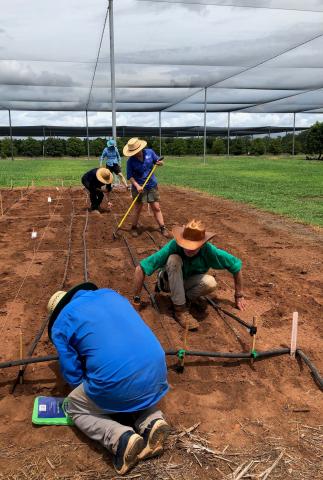Spice up your farm with summer sesame trials
Plains site in the NT early 2020.
Northern Australian farmers have the opportunity to test the suitability of high-value black sesame varieties in their cropping rotations by participating in this summer’s field trials being conducted by CQUniversity.
Details of how and why producers from across the Top End should get involved will be presented at a webinar to be held 4pm (AEST) next Tuesday, September 1.
CQUniversity is leading a large-scale research project funded by the CRC for Developing Northern Australia and supported by seed company AgriVentis Technologies, which is assessing the suitability of black sesame, fennel, carraway, kalonji, and cumin to broadacre production at six sites across Queensland and the Northern Territory.
Lead researcher, Associate Professor Surya Bhattarai, said last summer’s small plot trials of black sesame had proved a huge success, and producers were now being sought to host larger scale varietal assessments.
“The top-performing black sesame varieties in a range of northern Australian conditions have now been identified, with yields ranging from 1.37 tonnes per hectare up to 3.04t/ha depending on variety and location,” A/Prof Bhattarai said.
“The highest seed yields were recorded in Biloela followed by Rockhampton, Katherine, Ayr, and Darwin, and the lowest yield recorded in Tully. The oil yield between the varieties varied significantly at Biloela, Rockhampton and Darwin, but did not differ between the varieties at Ayr, Tully and Katherine, showing a significant genotype by environment interaction.”
The full results are contained in a technical report, available for download from the CRNCA website, containing detailed measures from each site on each variety’s yield, biomass, seed oil content and agronomic performance.
AgriVentis chief executive Lewis Hunter said seed from the leading varieties would be provided to growers for further testing on 0.5 to 1-hectare plots.
“CQUniversity will lead these commercial environment assessments and AgriVentis will support participating growers by purchasing the harvested crop for seed bulking purposes,” Mr Hunter said.
“While the early results are encouraging, there are still some challenges that need to be addressed before full-fledged production can commence, including weed control, optimisation of mechanical harvesting, and providing robust agronomic information especially concerning optimum planting times on the different regions and density of planting. This summer’s trials will contribute to answering those questions.”
Producers interested in participating in the project can email t.trotter@cqu.edu.au.
Media contact
Michael Thomson, CQUni, 0408 819 666

